Zaitsev - Guides d'étude, Notes de cours & Résumés
Vous recherchez les meilleurs guides d'étude, notes d'étude et résumés sur Zaitsev ? Sur cette page, vous trouverez 19 documents pour vous aider à réviser pour Zaitsev.
All 19 résultats
Trier par
 Très apprécié
Très apprécié
-
Organische chemie 1 en 2 - samenvatting + opgeloste oefeningen
- Resume • 78 pages • 2023
-
- €11,49
- 1x vendu
- + en savoir plus
Dit document omvat een samenvatting van organische chemie 1 en 2. Dit in combinatie met opgeloste oefeningen. Het is een klein atomaschrift dus het zou op A4 formaat overeenkomen met 40 paginas. Dit is ook het enige dat ik gebruikt hebt voor beide examens te leren en ik was voor beide ruim geslaagd
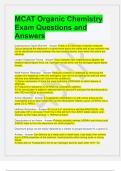
-
MCAT Organic Chemistry Exam Questions and Answers
- Examen • 20 pages • 2024
-
- €12,22
- + en savoir plus
MCAT Organic Chemistry Exam Questions and Answers Instantaneous Dipole Moment - Answer-Exists in an otherwise nonpolar molecule. Occurs because the electrons in a bond move about the orbital and at any moment may not be distributed exactly between the two bonding atoms, even when the atoms are identical. London Dispersion Forces - Answer-Occur between two instantaneous dipoles; the weakest dipole-dipole force (vs. hydrogen bonds which are the strongest dipole-dipole forces). Wolff-Kishner...

-
PSU Chem 210 Final Review Questions & Answers(Graded A+)
- Examen • 3 pages • 2024
-
Disponible en pack
-
- €9,77
- + en savoir plus
PSU Chem 210 Final Review Questions & Answers(Graded A+) E2 Reaction - ANSWEROne-Step with no intermediates, Base takes off proton + LG leaves with double bond formation. What type of carbons do E2 rxns favor? - ANSWERTertiary What is a Zaitsev product? - ANSWERDouble bond formation on more substituted carbon What is a Hoffman product? - ANSWERDouble bond formation on less substituted carbon When using a stericallly hindered base (t-BuOK, LDA), which product is more favorable? - A...
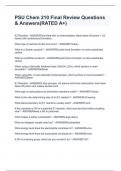
-
PSU Chem 210 Final Review Questions & Answers(RATED A+)
- Examen • 3 pages • 2024
-
Disponible en pack
-
- €10,75
- + en savoir plus
E2 Reaction - ANSWEROne-Step with no intermediates, Base takes off proton + LG leaves with double bond formation. What type of carbons do E2 rxns favor? - ANSWERTertiary What is a Zaitsev product? - ANSWERDouble bond formation on more substituted carbon What is a Hoffman product? - ANSWERDouble bond formation on less substituted carbon When using a stericallly hindered base (t-BuOK, LDA), which product is more favorable? - ANSWERHoffman When using Eto- or less sterically hindered ...
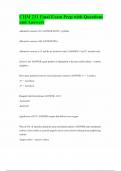
-
CHM 231 Final Exam Prep with Questions and Answers
- Examen • 6 pages • 2024
-
- €7,81
- + en savoir plus
CHM 231 Final Exam Prep with Questions and Answers Alternative sources of Cl ANSWER SOCl2 + pyridine Alternative sources of Br ANSWER PBr3 Alternative sources or Cl and Br are limited to what? ANSWER 1* and 2* alcohols only Zaitsev's law ANSWER major product of elimination is the most stable alkene -> carbon neighbors How many products form for each elimination reaction? ANSWER -1* = 1 product -2* = 2 products -3* = 3 products Reagents that form ketones ANSWER -CrO3 -N...
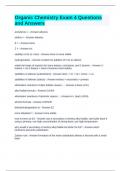
-
Organic Chemistry Exam 4 Questions and Answers
- Examen • 5 pages • 2024
-
Disponible en pack
-
- €10,26
- + en savoir plus
acetylenes = - Answer-alkynes olefins = - Answer-alkenes E = - Answer-trans Z = - Answer-cis stability of cis vs. trans - Answer-trans is more stable hydrogenation - Answer-exothermic addition of H to an alkene relate the heats of reaction for trans-butene, cis-butene, and 1-butene. - Answer-1-butene > cis-2-butene > trans-2-butene (most stable) stabilities of alkenes (substitution) - Answer-tetra- > tri- > di-> mono- > un- stabilities of alkenes (status...

-
PSU Chem 210 Final Review Questions & Answers(Graded A)
- Examen • 3 pages • 2024
-
Disponible en pack
-
- €14,17
- + en savoir plus
E2 Reaction - ANSWEROne-Step with no intermediates, Base takes off proton + LG leaves with double bond formation. What type of carbons do E2 rxns favor? - ANSWERTertiary What is a Zaitsev product? - ANSWERDouble bond formation on more substituted carbon What is a Hoffman product? - ANSWERDouble bond formation on less substituted carbon When using a stericallly hindered base (t-BuOK, LDA), which product is more favorable? - ANSWERHoffman When using Eto- or less sterically hindered ...
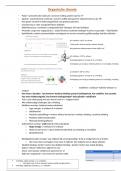
-
samenvatting Organische Chemie
- Resume • 17 pages • 2024
-
- €4,49
- + en savoir plus
Deze samenvatting bevat alle nodige theorie van het vak: de belangrijkste regels (Markovnikov, hybridisatie, Zaitsev, ... en een ordelijk overzicht per hoofdstuk van de reacties. Het vak heeft al jaren dezelfde cursus en wordt gegeven door A. Madder
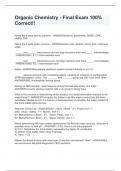
-
Organic Chemistry - Final Exam 100% Correct!!
- Examen • 6 pages • 2024
-
Disponible en pack
-
- €15,15
- + en savoir plus
Name the 6 polar aprotic solvents - ANSWERacetone, acetonitrile, DMSO, DMF, HMPA, THF Name the 5 polar protic solvents - ANSWERacetic acid, ethanol, formic acid, methanol, water ______ and ______ mechanisms are two step reactions that have _____ intermediates. - ANSWERSN1; E1; 2 Intermediates each ______ and ______ mechanisms are one step reactions that have _____ intermediates. - ANSWERSN2; E2; 1 Intermediate each Allylic - ANSWERresonance stabilized (carbon bonded directly to a C=C...
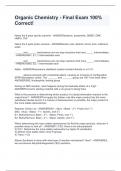
-
Organic Chemistry - Final Exam 100% Correct!
- Examen • 6 pages • 2024
-
Disponible en pack
-
- €15,64
- + en savoir plus
Name the 6 polar aprotic solvents - ANSWERacetone, acetonitrile, DMSO, DMF, HMPA, THF Name the 5 polar protic solvents - ANSWERacetic acid, ethanol, formic acid, methanol, water ______ and ______ mechanisms are two step reactions that have _____ intermediates. - ANSWERSN1; E1; 2 Intermediates each ______ and ______ mechanisms are one step reactions that have _____ intermediates. - ANSWERSN2; E2; 1 Intermediate each Allylic - ANSWERresonance stabilized (carbon bonded directly to a C=C...

5,99 € pour votre résumé de manuel multiplié par 100 camarades... Faites le calcul : c'est beaucoup d'argent ! Ne soyez pas un voleur de votre propre portefeuille et commencez à télécharger le vôtre maintenant. Découvrez tout sur gagner de l'argent sur Stuvia


